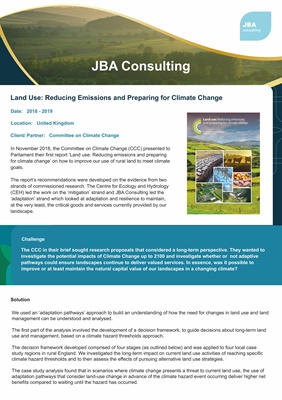
JBA Consulting
The CCC in their brief sought research proposals that considered a long-term perspective. They wanted to
investigate the potential impacts of Climate Change up to 2100 and investigate whether or not adaptive
pathways could ensure landscapes continue to deliver valued services. In essence, was it possible to
improve or at least maintain the natural capital value of our landscapes in a changing climate?
Challenge
In November 2018, the Committee on Climate Change (CCC) presented to
Parliament their first report 'Land use: Reducing emissions and preparing
for climate change' on how to improve our use of rural land to meet climate
goals.
The report's recommendations were developed on the evidence from two
strands of commissioned research. The Centre for Ecology and Hydrology
(CEH) led the work on the 'mitigation' strand and JBA Consulting led the
'adaptation' strand which looked at adaptation and resilience to maintain,
at the very least, the critical goods and services currently provided by our
landscape.
Land Use: Reducing Emissions and Preparing for Climate Change
Location: United Kingdom
Solution
We used an 'adaptation pathways' approach to build an understanding of how the need for changes in land use and land
management can be understood and analysed.
The first part of the analysis involved the development of a decision framework, to guide decisions about long-term land
use and management, based on a climate hazard thresholds approach.
The decision framework developed comprised of four stages (as outlined below) and was applied to four local case
study regions in rural England. We investigated the long-term impact on current land use activities of reaching specific
climate hazard thresholds and to then assess the effects of pursuing alternative land use strategies.
The case study analysis found that in scenarios where climate change presents a threat to current land use, the use of
adaptation pathways that consider land-use change in advance of the climate hazard event occurring deliver higher net
benefits compared to waiting until the hazard has occurred.
Date: 2018 - 2019
Client/ Partner: Committee on Climate Change